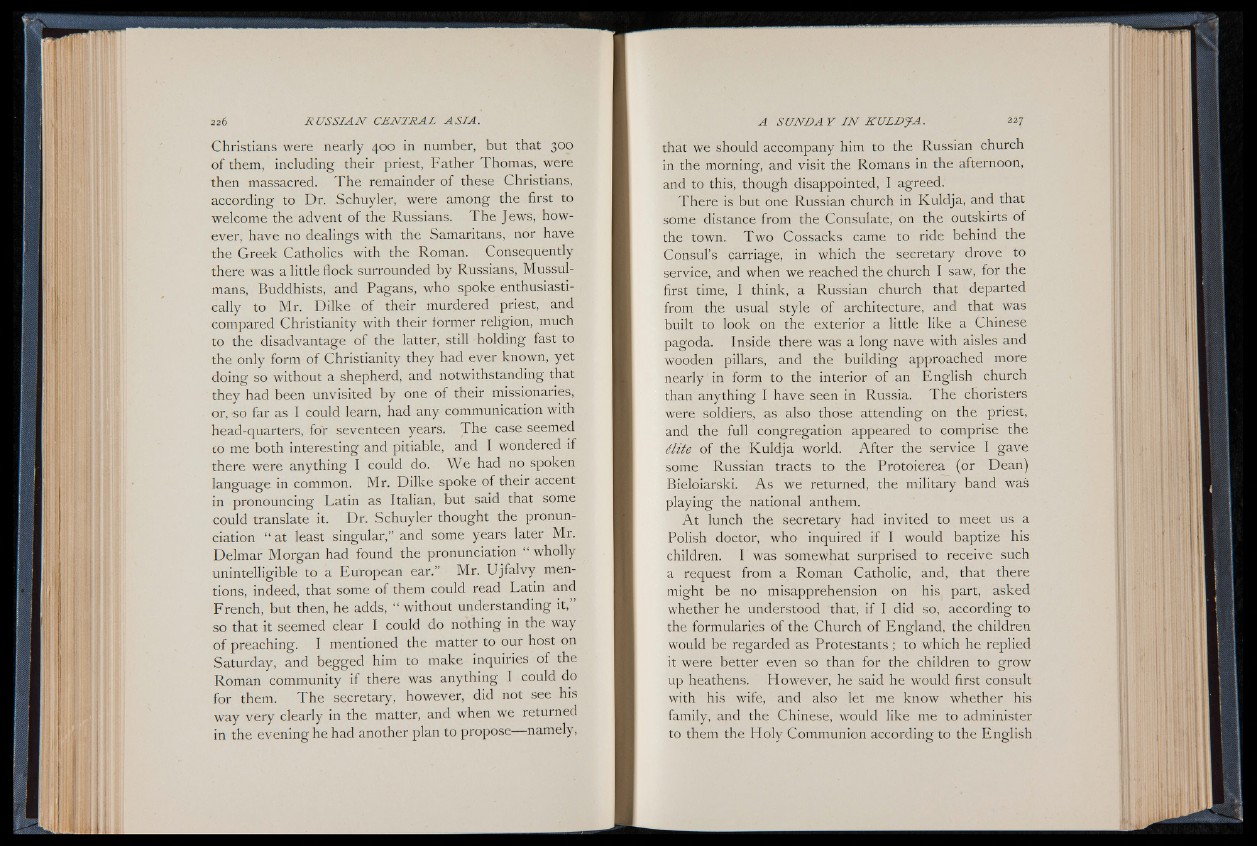
Christians were nearly 400 in number, but that 300
of them, including their priest, Father Thomas, were
then massacred. The remainder of these Christians,
according to Dr. Schuyler, were among the first to
welcome the advent of the Russians. The Jews, however,
have no dealings with the Samaritans, nor have
the Greek Catholics with the Roman. Consequently
there was a little flock surrounded by Russians, Mussulmans,
Buddhists, and Pagans, who spoke enthusiastically
to Mr. Dilke of their murdered priest, and
compared Christianity with their former religion, much
to the disadvantage of the latter, still holding fast to
the only form of Christianity they had ever known, yet
doing so without a shepherd, and notwithstanding that
they had been unvisited by one of their missionaries,
or, so far as I could learn, had any communication with
head-quarters, for seventeen years. The case seemed
to me both interesting and pitiable, and I wondered if
there were anything I could do. W e had no spoken
language in common. Mr. Dilke spoke of their accent
in pronouncing Latin as Italian, but said that some
could translate it. Dr. Schuyler thought the pronunciation
“ at least singular,” and some years later Mr.
Delmar Morgan had found the pronunciation “ wholly
unintelligible to a European ear.” Mr. Ujfalvy mentions,
indeed, that some of them could read Latin and
French, but then, he adds, “ without understanding it,
so that it seemed clear I could do nothing in the way
of preaching. I mentioned the matter to our host on
Saturday, and begged him to make inquiries of the
Roman community if there was anything I could do
for them. The secretary, however, did not see his
way very clearly in the matter, and when we returned
in the evening he had another plan to propose namely,
that we should accompany him to the Russian church
in the morning, and visit the Romans in the afternoon,
and to this, though disappointed, I agreed.
There is but one Russian church in Kuldja, and that
some distance from the Consulate, on the outskirts of
the town. Two Cossacks came to ride behind the
Consul’s carriage, in which the secretary drove to
service, and when we reached the church I saw, for the
first time, I think, a Russian church that departed
from the usual style of architecture, and that was
built to look on the exterior a little like a Chinese
pagoda. Inside there was a long nave with aisles and
wooden pillars, and the building approached more
nearly in form to the interior of an English church
than anything I have seen in Russia. The choristers
were soldiers, as also those attending on the priest,
and the full congregation appeared to comprise the
élite of the Kuldja world. After the service I gave
some Russian tracts to the Protoierea (or Dean)
Bieloiarski. As we returned, the military band was
playing the national anthem.
A t lunch the secretary had invited to meet us a
Polish doctor, who inquired if I would baptize his
children. I was somewhat surprised to receive such
a request from a Roman Catholic, and, that there
might be no misapprehension on his part, asked
whether he understood that, if I did so, according to
the formularies of the Church of England, the children
would be regarded as Protestants ; to which he replied
it were better even so than for the children to grow
up heathens. However, he said he would first consult
with his wife, and also let me know whether his
family, and the Chinese, would like me to administer
to them the Holy Communion according to the English